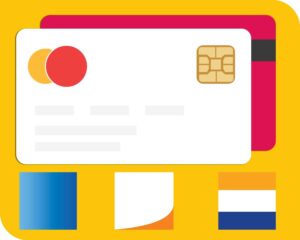Credit cards can be an important tool in building financial health, if managed properly. They can also negatively impact credit history if you don’t pay off your card or carry a high balance every month. You will want to make sure you are managing payments and not charging more than you can afford to pay or you may hurt your credit score rather than building it up.
When choosing a credit card, it’s important to consider these key factors:
Important Terms
- Minimum Payment: The bare minimum payment you are required to pay each billing cycle to avoid penalties and fees. Paying only this amount each billing cycle may avoid certain fees, but you will want to pay more than the minimum payment because failing to do so comes with consequences like racking up interest charges and hurting your credit score.
- Average Daily Balance: An accounting method to calculate interest by looking at your balance at the end of each day instead of the end of the week or month. If you hold a higher daily balance, you will have a higher interest rate assuming the card is not paid off each month.
- Annual Percentage Rate (APR): The rate that the creditor applies to calculate interest charges if you carry a balance on your account. The APR is shown as a percentage.
- Grace Period: There are two types of grace periods. The first is the time between the end of your billing cycle and the payment due date. During this time, you may not be charged interest as long as you pay your bill on time. The second is the period of time beyond the due date that the lender gives customers to make their payments. Most credit cards provide a grace period, but it is not required.
- Available Credit: The amount of funds left available within the credit limit. This is calculated by subtracting purchases (including interest) from the credit limit.
- Credit Limit: The maximum amount of credit that can be borrowed while using the credit card.
- Interest rate: Look out for interest rates when applying for a credit card, as your interest rate can affect your monthly payment totals. Interest rates are typically shown as a yearly rate called the Annual Percentage Rate (APR). If you pay your entire balance every month by the due date, interest rates may not affect you. If you pay your bills on time and have a good credit score, you can qualify for credit cards with a higher credit limit and lower interest rates.
- Fees: Look for any fees that may occur with your credit cards, such as annual fees, which is a charge you pay once a year for using a card. Late payment fees can be charged when you fail to pay your minimum balance due. Be cautious of your credit limit. There may also be “Over the Limit Fees” when you overcharge your card past the credit limit.
- Rewards: Some credit cards come with benefits for being with them, creating more incentives for spending. Credit card companies will give you a percentage of money back if you shop at selected stores in a given month, giving you cashback to your wallet. Depending on your credit score, you may be eligible for a credit card with airline miles. These cards typically require a higher credit score.
- Credit Limit: When applying for credit cards, your credit limit is determined by various factors like your income, repayment history, credit score, number of credit cards, and large expenses. According to this article from CNBC, Americans have a total of around $22,751 in credit available across all of their credit cards on average.
While looking for some of these factors, you should also consider the type of credit card you are interested in obtaining. There are many different types of credit cards out there.
Types of Credit Cards and Incentives
- Cash Back: Many lenders officer cash back with rewards on certain purchases. The cash back will typically either come in the form of a check or a credit on your statement.
- Airline or Hotel: Some lenders offer miles or points you can redeem for free flights or hotel stays with the airline or hotel chain partnering with the card issuer. Check for any restrictions, such as blackout dates.
- General Travel: These cards reward you with points to use for any travel expense. These are usually more flexible than airline or hotel credit cards.
- Store Credit Cards: If you get a credit card associated with a certain store, such as Home Depot, Costco, and Walmart, they will reward you by providing discounts or other benefits like lower interest on promotional items for purchases made at that store.
- Low Interest: While these cards don’t provide rewards, the lower interest rate makes it less expensive for you to carry a balance. These cards often come with an introductory 0% APR period, allowing you time to pay off large purchases interest-free.
- Balance Transfer: Some cards offer lower interest when you move your balance over from a higher interest card. Keep in mind that the lower interest rate may only be for a certain period of time after moving your balance over. There may also be a balance transfer fee when you move your balance from one card to another.
- Secured: A secured card requires a refundable security deposit which serves as collateral on the account. Because the deposit reduces the risk to the issuer, you more likely to be approved for this card. Using a secured credit card and paying on time can help build your credit and make you eligible for an unsecured credit card.
- Student: While these cards don’t usually require you to be a student, they help you build credit. The credit limit is typically lower, and they don’t offer many incentives. If you’re younger than 21 years old and do not have any independent income, you will need a parent, guardian, or other adult to co-sign the application.
Choosing a credit card doesn’t have to be scary. These tips can help you get on track for a successful credit experience.
Check out these links for more information on credit cards and personal banking:




